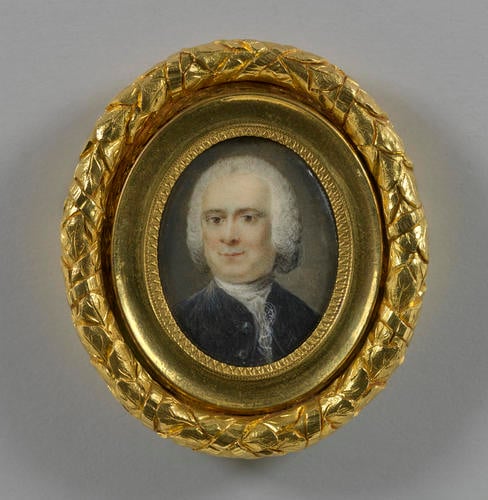-
1 of 253523 objects
Jean-Jacques Rousseau (1712-1778) c.1762
Watercolour on ivory | 3.1 x 2.4 cm (support, canvas/panel/stretcher external) | RCIN 420816

French School
Jean-Jacques Rousseau (1712-1778) c.1762
-
Jean-Jacques Rousseau (1712-78) the French philosopher and writer who was born in Switzerland, came to fame from the 1750s onwards with a number of works which were highly critical of the existing social order. His philosophy was underpinned by a belief in the fundamental goodness of human nature and the warping effects of civilization, encapsulated in the concept of the 'noble savage'.
In his novel Émile (1762), Rousseau pioneered new educational principles which advocated individual development in natural surroundings, protected from the corrupting influence of civilization. His Social Contract (1762) anticipated much of the thinking of the French Revolution and his Confessions (1782) was one of the earliest autobiographies. He lived in England for a period with a pension from George III. The Monthly Review described him as a man 'whose heart was made to feel the great, the good, the beautiful, and the affecting'. His portrait by Allan Ramsay is in the National Gallery of Scotland.
This miniature is based on the pastel drawing by Maurice-Quentin de la Tour dated to about 1762 and now in the Musée Saint-Quentin, France. A line engraving of this, by Littret de Montigny, with Rousseau's motto from Juvenal VITAM IMPENDERE VERO (to consecrate life to the truth), was published in 1763, but it was a popular image and the miniaturist could have had access to several similar engravings. The identity of the artist is unknown.
Inscribed on the back in ink: J.J. Rousseau. The miniature is preserved in the rim of a late eighteenth-century gold locket.Provenance
First recorded in the Royal Collection in 1910
-
Creator(s)
(artist) -
Medium and techniques
Watercolour on ivory
Measurements
3.1 x 2.4 cm (support, canvas/panel/stretcher external)
5.3 x 4.6 cm (frame, external)
Category
Object type(s)